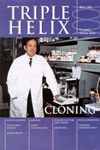In 1985 Tuckett proposed that a consultation should be seen as a meeting of two experts.[1] The doctor is an expert in biomedicine; the patient is an expert in his or her own life, goals, priorities, beliefs, and choices. Humane medicine happens when the role of both is given value. This is reflected in Jesus' intriguing question to the blind man whose need was apparently obvious: 'What do you want me to do for you?'[2]
A DoH Task Force has published its recommendations in a report entitled 'The Expert Patient: a new approach to chronic disease management in the 21st century'.[3] The report calls for patients with chronic diseases to be seen not as passive recipients of care, but as experts and partners with us in the treatment process. This has benefits in improving patients' self-efficacy - their confidence in their own ability to solve problems and reduce dependency and disability.
I admit to being sceptical about the usual suspects. The proposals will be piloted between 2001 and 2004, and 'between 2004 and 2007 programmes will be mainstreamed within all NHS areas' (p8), so clearly the fleetingly mentioned evaluation of the pilots is not expected to change the set policy. The report talks of PCTs commissioning projects (p31), but does not acknowledge that the DoH therefore has a reciprocal responsibility to fund them. And can a change of culture be imposed from the top within a framework that is overtly politically and often cynically driven?
Medics and politicians both want to be seen as the champion of the patient. We need to admit that we both fail to live up to our rhetoric. We should not be afraid to share our professional power with our patients. We hold that power as stewards, for their benefit. Jesus calls us to be 'as shrewd as snakes and as innocent as doves'.[4] Yes, we need to scrutinise these proposals with constructive caution, but I believe we should welcome this report's vision of greater patient empowerment with open arms.
































